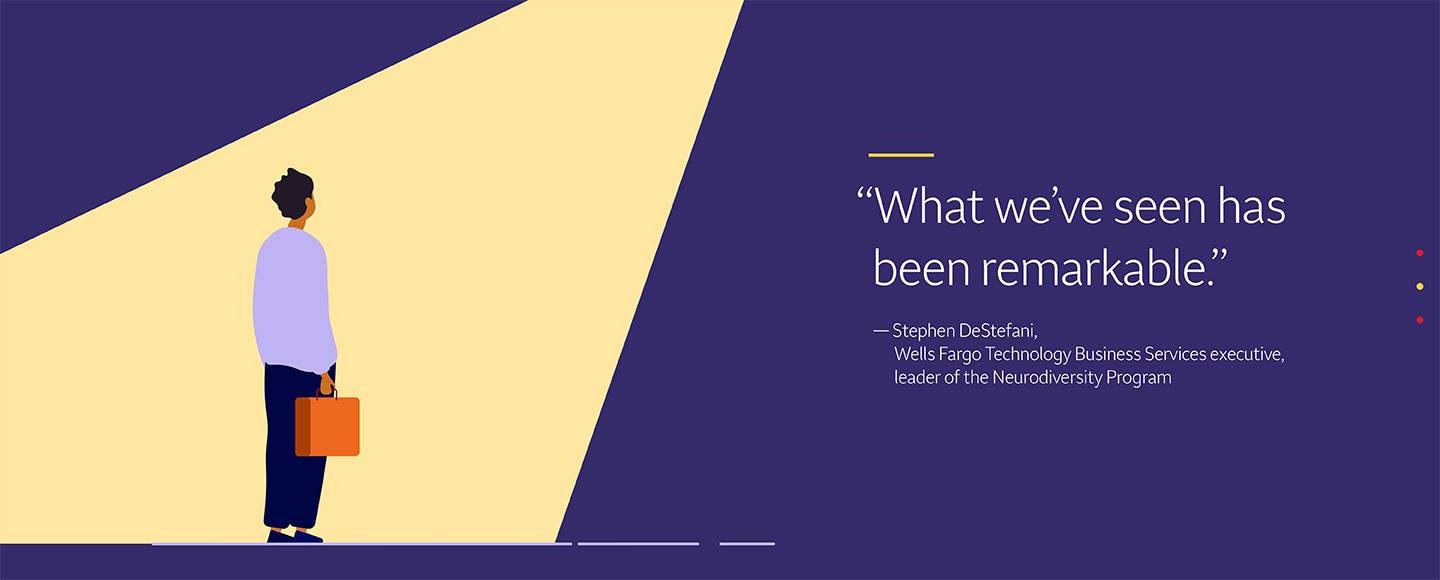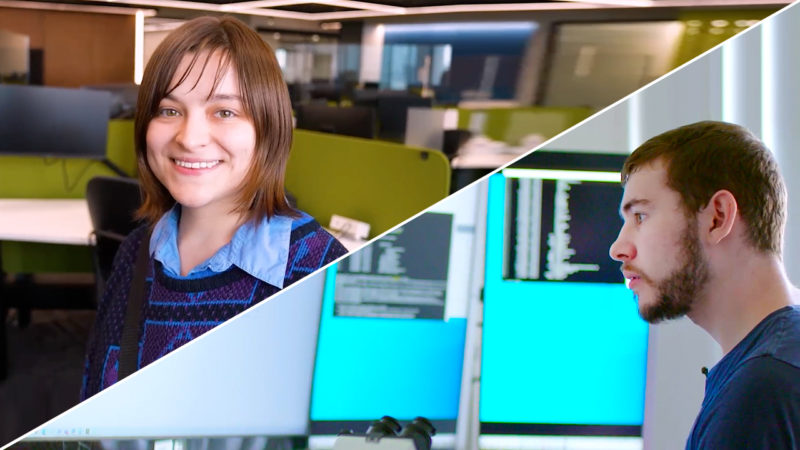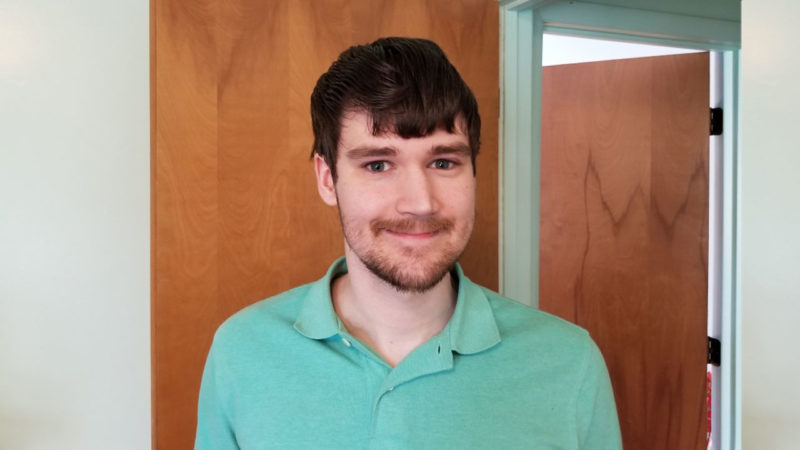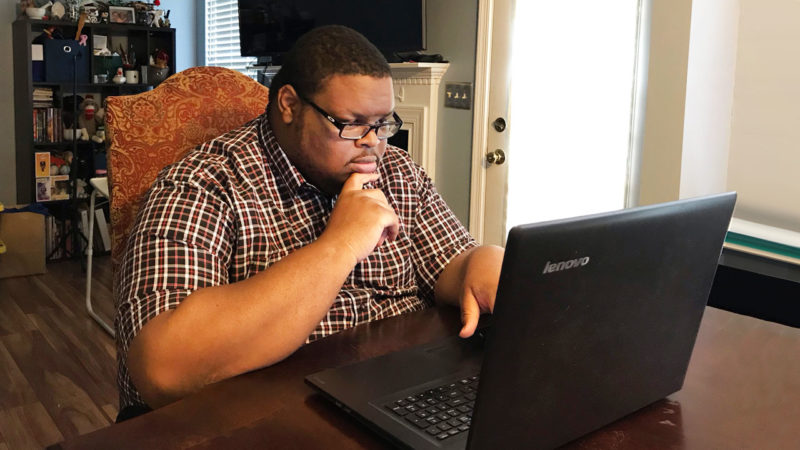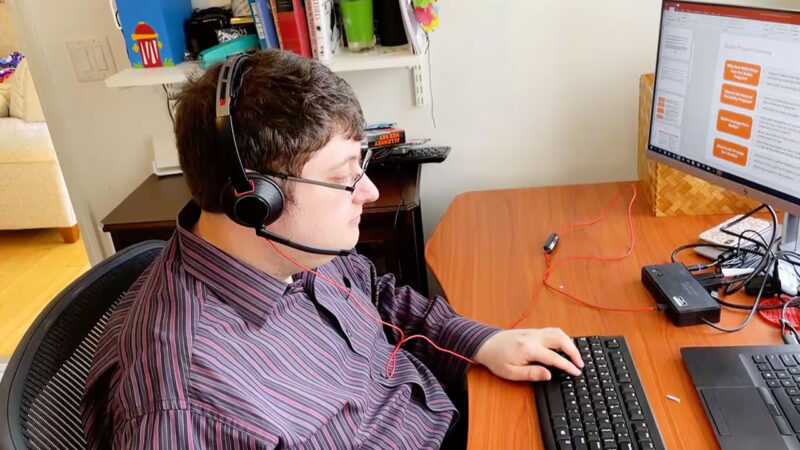‘We’re people who have different abilities, and there’s a lot of talent in this community that is just untapped’
Wells Fargo’s Neurodiversity Program celebrates the range of differences among individuals and provides structure and support to help all employees flourish.
Updated Nov. 18, 2022: Wells Fargo’s Neurodiversity Program has a new class of participants. Meet some of them in a new video below.
Christopher Long has been fascinated by computers for as far back as he can remember, and it’s why he chose to study computer science in college. But finding a job in the field after graduation proved difficult. Despite having a few work experience programs under his belt, including Broad Futures, which helps prepare young adults with learning disabilities for the workforce, Long found himself sending out countless resumes with little success. He says he isn’t big on small talk and can struggle in group settings. It wasn’t until he participated in the selection process for Wells Fargo’s Neurodiversity Program — which he describes as an extended interview comprised of programming exercises, activities, and meetings — that he received a job offer.
“I’ve definitely enjoyed the work, and I’ve found my coworkers and my manager to be highly welcoming and ready to help people out when they need it.” — Christopher Long
“I was excited, and to be honest, more than a little relieved because I’d been job hunting for a while, and it can be a real slog,” said Long, now an engineering analyst at Wells Fargo. “I’ve definitely enjoyed the work, and I’ve found my coworkers and my manager to be highly welcoming and ready to help people out when they need it.”
A new way of assessing and hiring talent
Long is one of nine full-time employees hired through Wells Fargo’s Neurodiversity Program, which launched in April 2020 as part of the company’s overall commitment to hiring talent and building a diverse workforce.
Neurodiversity describes the range of differences in individual brain functions and behavioral traits, including sociability, learning, attention, and other mental functions. This includes people with autism spectrum disorder, attention deficit hyperactivity disorder, and Tourette syndrome, among others — a population that historically has been underserved in the job market.
“This program is about providing meaningful opportunities for people with diverse abilities and creating a strategic advantage for Wells Fargo by bringing extraordinarily valuable, unique skills and perspectives to our company from a rich, untapped talent pool.” — Saul Van Beurden, head of Wells Fargo Technology
The Harvard Business Review cites a report that as many as 80% of people with neurodiversity have not had a job or pursued college education after leaving high school. According to the U.K.’s Office for National Statistics, only about 22% of adults with autism are employed.
The work entry barrier can be exacerbated by differences in social norms between hiring managers and prospective job candidates, which is part of what the Neurodiversity Program aims to improve. A tailored interview approach (also known as SuperWeek) based on workshops and interactive, team-based problem solving allows candidates to showcase their talent in a more comfortable environment over the course of several days, leading to more comprehensive assessment by managers. At Wells Fargo, that’s paired with ongoing training, mentoring, and accommodations to help individuals succeed in their roles.
Other goals of the program include promoting employee self-identification and establishing an employee “Buddy Program” to aid transitions into the Wells Fargo workplace and culture by the end of the summer. Externally, the program hopes to establish partnerships with neurodiversity organizations, academic partners, and community nonprofits to help identify candidates and provide support for participants and teams.
“Expectations for how people speak or behave are very set, and there’s a bias there if you don’t fit that mold,” said Alex Lieberman, one of the nine hires. “However, Wells Fargo lets me be flexible. For instance, I’m not made to sit in front of a computer for eight hours straight. But they give me an important amount of work to get done and provide me guidance in different ways.”
‘What we’ve seen has been remarkable’
“Some of our participants have been able to learn new coding languages in one to three weeks, compared to the industry standard of six months. They’ve shown an aptitude and eagerness to learn and build the skills required to succeed on their team, and in some cases, even become subject matter experts in new technology.” — Stephen DeStefani, Wells Fargo Technology Business Services executive and leader of the Neurodiversity Program
Stephen DeStefani, Wells Fargo Technology Business Services executive and leader of the Neurodiversity Program, calls the program the most rewarding work of his career. Participants are placed into strategic professional technology roles, such as a systems engineer, developer, or data analyst. They also join a cross-functional agile team that includes a designated support system of coaches and mentors.
Long, for example, has been working on creating pages to help detect suspicious transactions that may be fraudulent or noncompliant. He learned a new programming language, C#, and leveraged this with his existing coding language knowledge to propose and implement a solution for reducing production time in aggregating data.
“Everyone involved in this effort is so passionate about it, and what we’ve seen is remarkable,” DeStefani said. “Some of our participants have been able to learn new coding languages in one to three weeks, compared to the industry standard of six months. They’ve shown an aptitude and eagerness to learn and build the skills required to succeed on their team, and in some cases, even become subject matter experts in new technology.”
“This program is about providing meaningful opportunities for people with diverse abilities and creating a strategic advantage for Wells Fargo by bringing extraordinarily valuable, unique skills and perspectives to our company from a rich, untapped talent pool,” said Saul Van Beurden, head of Wells Fargo Technology.
‘It makes me feel a lot more positive about the future’
David Miller didn’t socialize much during college while earning his bachelor’s and master’s degrees in computer science. Although he’d never seen a line of code before taking courses as an undergrad, Miller built a strong Java programming background. After graduation, his mother connected him with Greensboro Vocational Rehabilitation Services, which helps people with various disabilities find employment. Through a connection to one of Ernst and Young’s Neurodiversity Centers of Excellence, he also participated in SuperWeek and joined Wells Fargo shortly after.
“I got the feeling they were interested in me because of the material I studied, and wanted to find people who had abilities and provide them ways to use those abilities in ways that are beneficial to the company,” Miller said of Wells Fargo, where he is an engineering analyst. “The work culture is very positive, and just an environment that really induces that feeling of comfort and being able to grow into my position.”
“People have a different way of seeing the world or understanding information. And I believe everyone is capable of learning, it’s just sometimes the manner of learning that they require is different. Having a job gives me something to do to motivate myself and be able to use what I’ve learned in school." — David Miller
Miller learned the programming language Python through his work, and has been using that skill to deliver user functionality that is increasing in complexity. While he’s currently living at home, he said having a full-time job and earning a paycheck has given him a sense of independence.
“People have a different way of seeing the world or understanding information,” Miller said. “And I believe everyone is capable of learning, it’s just sometimes the manner of learning that they require is different. Having a job gives me something to do to motivate myself and be able to use what I’ve learned in school. “It makes me feel a lot more positive about the future. A lot of my fear has been put to rest, and I feel like I can keep moving forward on the path to adulthood.”
Making a difference long-term
DeStefani says the program’s ultimate goal is to hire 300 to 400 candidates globally by 2023. This includes expanding technology jobs to include information security, infrastructure, and technology operations roles, as well to functions across Wells Fargo, including Finance and Risk. The first phase of the program has also provided key takeaways on hiring for aptitude rather than deep skills and experience, as well as the importance of being flexible when someone doesn’t exactly fit the job description.
Lieberman, who has a bachelor’s degree in creative writing and a master’s degree in public history, didn’t have the technical experience Wells Fargo was initially seeking. But his communication, organization, drive, and overall commitment to advocacy impressed DeStefani enough during SuperWeek that DeStefani converted one of his analyst positions to bring Lieberman on board as the neurodivergent employee enrichment workstream leader for the Neurodiversity Program.
“There’s a common perception that we’re all children, and there’s a small but growing perception like we’re all superheroes waiting to burst forward with incredible powers, and neither of those are true. We’re people who have different abilities, and there’s a lot of talent in the community that is untapped.” — Alex Lieberman
“Most initiatives are done from the top down, which is good, but not always in tune with the members of the population,” Lieberman said “We work together to provide different perspectives and build a sensitive and well-grounded approach to making sure everything makes sense to us.
“There’s a common perception that we’re all children, and there’s a small but growing perception like we’re all superheroes waiting to burst forward with incredible powers, and neither of those are true,” he added. “We’re people who have different abilities, and there’s a lot of talent in the community that is untapped.”

